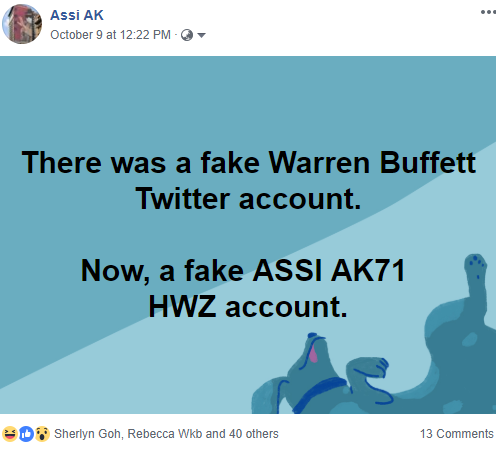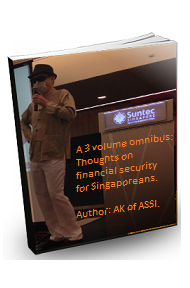Another one has emerged:
 The Monetary Authority of Singapore (MAS) has placed EcoHouse Group - an overseas property development firm which specialises in the construction of investor-funded housing for Brazilian families - on its Investor Alert List (IAL).
The Monetary Authority of Singapore (MAS) has placed EcoHouse Group - an overseas property development firm which specialises in the construction of investor-funded housing for Brazilian families - on its Investor Alert List (IAL).
The IAL is a list of unregulated entities that may have been wrongly perceived as being licensed or authorised by MAS.
Since September 2011, EcoHouse has attracted more than 1,500 local investors, with a total investment sum of S$65.55 million, to its Brazilian property development projects.
Source: The Business Times, 7 July 2014.
"The Company's CEO had invited investors to keep their minimum capital outlay with EcoHouse for three years rather than one and receive immediate 20% returns. Although investors were under no obligation to accept the longer term, there was reportedly an overwhelming response to the offer. The investment was also supposedly endorsed by several prominent local property websites and investment group."
Source: SGPropTalk
EcoHouse sounds like a great business. Simplistically, imagine giving back 20% of $65.55 million to investors and keeping $52.44 million to be utilised in one way or another.
We must always ask:
1. Where is the source of income?
(How is income being generated?)
2. Is that income source sustainable?
If someone borrowed $100 from us and gave us a return of 20% upfront, promising to return to us the capital in full 3 years later, we would effectively be lending him $80, not $100. Upfront, we would be taking back $20 of our own money, not his. We haven't made any money.
Whether that $80 would come back later or not is anyone's guess. What? It was supposed to be $100? Oh, my apologies. I have misunderstood. $100 is it.
(Frankly, it doesn't matter whether it is $80 or $100 to AK since the money might never come back.)
Related posts:
1. Get 24% yield in 24 months.
2. Invest in real estate for high returns.
PRIVACY POLICY
Featured blog.
1M50 CPF millionaire in 2021!
Ever since the CPFB introduced a colorful pie chart of our CPF savings a few years ago, I would look forward to mine every year like a teena...

Archives
Pageviews since Dec'09
Recent Comments
ASSI's Guest bloggers
- boon sun (1)
- Elsie (1)
- Elvin H. Liang (1)
- ENZA (3)
- EY (7)
- FunShine (5)
- Invest Apprentice (2)
- Jean (1)
- JK (2)
- Kai Xiang (1)
- Kenji FX (2)
- Klein (2)
- LS (2)
- Matt (3)
- Matthew Seah (18)
- Mike (6)
- Ms. Y (2)
- Raymond Ng (1)
- Ryan (1)
- Serejouir (1)
- skipper (1)
- Solace (13)
- Song StoneCold (2)
- STE (9)
- TheMinimalist (4)
- Vic (1)
Resources & Blogs.
- 5WAVES
- AlpacaInvestments
- Bf Gf Money Blog
- Bully the Bear
- Cheaponana
- Clueless Punter
- Consumer Alerts
- Dividend simpleton
- Financial Freedom
- Forever Financial Freedom
- GH Chua Investments
- Help your own money.
- Ideas on investing in SG.
- Invest Properly Leh
- Investment Moats
- Investopedia
- JK Fund
- MoneySense (MAS)
- Next Insight
- Oddball teen's mind.
- Propwise.sg - Property
- Scg8866t Stockinvesting
- SG Man of Leisure
- SG Young Investment
- Sillyinvestor.
- SimplyJesMe
- Singapore Exchange
- Singapore IPOs
- STE's Investing Journey
- STI - Stocks Info
- T.U.B. Investing
- The Sleepy Devil
- The Tale of Azrael
- TheFinance
- Turtle Investor
- UOB Gold & Silver
- Wealth Buch
- Wealth Journey
- What's behind the numbers?
EcoHouse Group placed on the Investor Alert List (IAL)
Saturday, July 12, 2014Posted by AK71 at 3:29 PM 7 comments
Labels:
ASSI,
investment,
real estate
45 years old, to get a bigger HDB flat or to invest?
During InvestX Congress last month, I said that sometimes, readers who are older would write to me and ask why I always blog about starting young. What about people in their 40s or 50s?
Well, I received one such email recently from J and she asked me:
1.
First, I hope u can give some suggestion or put yourself in the position
of those who realise the importance of the passive income at their later
age, say 40s. Eg, If I m 45 with small cash and a hdb......so how could i
turn my life instead of ....do nothing. (b4 45.....dont have any depth
financial plan, but with a good job which provide ....still can
survive+small saving income, moderate incurance & etc)
2.
Would you mind to do a comparison on invest in a bigger HDB or use the
money to invest in a condo or maybe factory unit with a cash of $300k? I
hope to know your view/opinion is because currently I own an 3rm HDB, but
a little crowded as my children already grow. So, my initial plan is to
change a bigger HDB, then invest a condo/warehouse with the balance of the
cash. But, there is a rule that if i own the HDB after 2010 (if I m not
wrong), i must sell my HDB if i invest in a condo. This also mean that I
lost a way to make some passive income by collecting rental.
My reply to J:
Hi J,
If I were 45, I would have to work doubly hard compared to someone in his 20s or 30s to achieve the same result by age 65, all else remaining equal.
However, if that was impossible, for various reasons, then, I would have to moderate my expectations and have a lower passive income compared to younger people, again, all else remaining equal.
In the end, it is really what kind of lifestyle we have and expect to have at retirement. If we have a simple lifestyle and with all our children grown up and supporting themselves, logically, we won't need as much money. No more big ticket items except for possible hospitalisation which should be taken care of by a good H&S policy.
If I were still holding a good job at age 45 and had sufficient savings to last a few years even if I were jobless, I would continue to save as much as possible and be prepared to invest when the opportunities present themselves. It is only a matter of time.
As for your HDB flat, it is for living, not investing. If you need more space because your children are bigger now, you should get a bigger flat. If you want more space when you don't really need it, then, that is different. I believe that there is a 5 years M.O.P. once you move into a bigger flat. I could be wrong because I am not well versed in matters to do with HDB flats.
Generally, I do not think investing in residential or industrial properties in Singapore now is a good idea. A huge surge in supply in the next few years will put a dampener on rentals and prices. However, there could always be offers which are good value for money. It is just harder to find them. I would take a look when there is blood on the streets. All investments are good at the right price, after all.
Remember, I am not offering any advice. Just sharing my thoughts.
If you have any ideas which you would like to share, please do so in the comments section. Appreciate a meaningful discussion, as always. I don't know everything there is to know, I am sure.
Related posts:
1. To retire by age 45, start with a plan.
2. Retiring before 60 is not a dream.
3. Buying an apartment: Considerations.
4. Affordability and value for money.
5. Five points we ignore at our own risk.
6. What should I do? Letter from a 64 year old.
7. A letter from a 66 year old retiree.
Posted by AK71 at 11:40 AM 23 comments
Labels:
HDB,
investment,
passive income,
real estate,
savings
Afternoon tea break with AK.
Friday, July 11, 2014
This is what I am having for afternoon tea breaks for the next two weeks:
 |
| Just add 200ml of hot water. |
 |
| Voila! |
Bought a bag from NTUC Fairprice.
Each serving is cheaper than a curry puff.
Tastes good and is probably healthier too.
Related post:
What did you drink for tea break?
Posted by AK71 at 4:39 PM 6 comments
Labels:
meal
Why fixed deposits over structured deposits?
Recently, I came across offers from two banks to place money in structured deposits offering higher returns than fixed deposits.
The promised returns were approximately 1.45% to 1.85% per annum in return for the funds being locked up for 4 to 6 years.
I was NOT attracted by these offers because:
1. Whether this money is a part of my emergency fund or my war chest, in the event that I need to use the money during the lock up period, there will be punitive costs which I have to bear.
2. To avoid these costs, once in, the only option is to stay with the product till maturity.
A time period of 4 to 6 years is relatively long and there is a good chance that opportunities might come knocking during that time.
3. There are many offers of promotional interest rates for fixed deposits by banks here and I recently placed some money in a 15 months fixed deposit for an interest rate of 1.25% per annum.
Being offered only 0.2% to 0.6% higher interest rate per annum in return for a 4 to 6 years lock up period seems inadequate to me.
4. With fixed deposits, there are no punitive costs to bear (except to lose the higher interest rate) if I should have need for early withdrawal.
Whether it is money in my emergency fund or money in my war chest, 12 months fixed deposits (give or take a few months) with "promotional" interest rates are good enough for me to park a large portion of the money.
The rest of the money should be retained in my savings and trading accounts to meet short term needs and to react more quickly to emergencies and opportunities.
Structured deposits could be a good thing for some savers but unless the lock up period is much shorter while retaining higher interest rates compared to 12 months fixed deposits I doubt it is a good thing for investors.
Related posts:
1. A special chest for emergency funds.
2. A "foreign" chest for emergency funds.
Posted by AK71 at 12:25 PM 10 comments
Labels:
investment,
money management,
savings
A "foreign" chest for emergency funds.
Thursday, July 10, 2014
 I wrote about the importance of having an emergency fund before and how it should be locked away. I also explained why I park my emergency fund in fixed deposits.
I wrote about the importance of having an emergency fund before and how it should be locked away. I also explained why I park my emergency fund in fixed deposits.
My preference has, thus far, been to park the money in UOB fixed deposits because I have a relationship with them and it is convenient for me. I simply have them deposit the principal plus interest into my UOB savings account upon maturity of the fixed deposits.
With the foreign banks, I have to tell them to send me a cheque (and make sure they do it) or to visit them to withdraw the money when the fixed deposit matures. So, although the foreign banks have been pretty aggressive in offering higher interest rates for fixed deposits, I didn't bother with them.
Apart from the perceived lack of convenience, was there any other reason why I didn't accept the many offers of higher interest rates from the foreign banks? Well, I just didn't think that the difference in returns is meaningful enough to compensate me for any inconvenience.
So, for example, Standard Chartered Bank is currently offering 1.25% interest per annum for a 15 months fixed deposit and 1.15% per annum for a 8 months deposit. This compared to 1.08% per annum for a 13 months deposit offered by UOB. The difference is 0.07% to 0.17% in interest rate per annum. Doesn't look like a big deal, right?
However, using the same argument I used before in comparing the interest rates for the CPF-SA and the CPF-OA, 0.07% is actually 6.48% more than 1.08% while 0.17% is 15.74% more!
So, although in absolute dollar terms, for a $100,000 fixed deposit, the difference over a one year period is only between $70.00 to $170.00 and does not look like a big deal, I convinced myself that it sufficiently compensates me for the effort to visit the bank upon maturity of the fixed deposit next year. For a bit of work, it is probably worth it.
Related post:
A special chest for emergency funds.
Posted by AK71 at 12:05 PM 5 comments
Labels:
insurance,
money management,
savings
A new flat on the way and $200K in spare cash.
Wednesday, July 9, 2014
She and her husband have some $200K in spare cash. She is in her 20s and they have a new flat on the way. This is my reply to questions posed by her:
Hi YX,
Firstly, please remember that I am not giving advice. However, I can share what I would do given the same set of circumstances. :)
1. I would take a 30 year housing loan instead of 10 years even though I might have the ability to pay it off at one go. It is less of a burden in case bad things should happen. If I had more spare cash over time, there is the option to pay down the loan, doing partial capital repayments.
2. I would invest some of my spare cash for higher returns. This would make sense as long as the returns are higher than the interest payments on the housing loans, all else remaining equal. If interest rates go sky high, then, it would be time to pay down the loan. Some of the spare cash goes into an emergency fund and the rest goes into a war chest, waiting for investment opportunities.
3. I don't think it is a good time to be in bonds. Higher interest rates on the horizon make bonds a bad investment now, I feel. Cash, we always need to have. Doesn't matter that the banks pay peanuts for our savings. Gold is an insurance and conventional wisdom says we should have 5 to 10% of our wealth in precious metals. However, it doesn't generate income.
My approach is about having stronger cash flow while keeping necessary debt manageable, if any at all. Also, we always need liquidity and insurance in life. Why? Because bad things happen in life. As long as we are prudent in our finances, always saving some money and investing for income, we will do well over time. :)
Best wishes,
AK
If you have any ideas which you would like to share, please do so in the comments section. I am sure a meaningful discussion would be appreciated.
Related posts:
1. Gear up and receive more passive income.
2. InvestX Congress: Q&A (some relevant questions).
3. What should I do when I am down 25%?
4. Buying an apartment. (See point 2)
5. Young working Singaporeans, you are OK?
Posted by AK71 at 1:40 PM 31 comments
Labels:
HDB,
investment,
passive income,
real estate,
savings
CheapOair means more options for cheap travel deals.
CheapOair. The name gives me the impression that it is a place to find cheap air tickets.
A friend's dad told me about them recently and, quite coincidentally, while checking my messages over the weekend, I found a pending offer from them to become an affiliate. Get good deals and maybe make some pocket money by spreading the word? Sounds like a fair enough proposition. I decided to check it out. Link:
I searched for air tickets to Osaka for the month of August and was offered a round trip ticket from US$499.00. Not bad.
 |
What about Melbourne? Lowest fare was US$478.00 by AIR ASIA X.
Remember what I said about ZUJI (ZUJI Flights Home Page
If you get a good deal using the text link above, AK gets a small commission:
Win-win. Kamsiah you. Yeah!
Related posts:
1. Macarons from ZUJI.
2. Planning to travel? Check out ZUJI.
Posted by AK71 at 12:12 PM 4 comments
Labels:
advertorial
What did you drink for tea break?
Tuesday, July 8, 2014
Got to try something new for tea break:
 |
| New arrival in the office pantry. |
 |
| Smells good. Tastes yummy too. |
What did you drink for tea break? Not something with stars and costs many bucks, I hope. ;p
Related posts:
1. How I earned $9,216 with a mug?
2. Think we can't save $400,000?
Posted by AK71 at 3:55 PM 16 comments
A Beginner's Guide to Investing in Stocks.
The internet is full of free and good resources. We are lucky to be in a country where we can get lots of information we need easily online. Of course, there will always be complaints about the lack of freedom but I personally don't feel that freedom is lacking.
Anyway, the purpose of this blog post is to share useful information on investing in stocks in Singapore for beginners. Yes, you might have guessed it. I receive emails sporadically from readers regarding what to do in order to start trading in the Singapore stock market.
 |
| An old photo taken with my old Samsung phone. Nice? Which phone was that? Have tea with AK and find out: here. |
As this information (and more) has been provided by the SIAS on their Q&A page, I would like to provide the link here in my blog for easy reference:
SIAS: A Beginner's Guide to Investing in Stocks.
Shan't duplicate the good work done by SIAS.
What? I am just being lazy?
OK, you saw through me. Bad AK! Bad AK!
However, I will add that before we take that step into the world of investing and trading in stocks, we should get ourselves educated in FA and/or TA first. There are lots of resources available out there and good books to help us too. To this end, have some "Food for Thought" found in my blog's right sidebar.
Also, make sure that we have our emergency fund in place and the necessary insurance coverage to help us to be financially secure first. You might want to read related post #4 by Solace, a regular guest blogger.
Happy reading and I hope you enjoy the experience.
Related posts:
1. Risks and rewards: FA and TA.
2. Recommended books for FA and TA.
3. Free e-book by AK.
4. Getting ready for investment.
5. Getting started in stock investing (Illustrated).
"The book is obviously written with the beginner in mind. However, any seasoned stock market participant who is in the FA or TA camp would find this book a worthwhile read if he is willing to keep an open mind."
Posted by AK71 at 1:15 PM 4 comments
Labels:
investment
Revisiting AK's simple strategy with Charlie Munger.
Monday, July 7, 2014
Readers who attended InvestX Congress last month would remember that I quoted Charlie Munger:
"It takes character to sit there with all that cash and do nothing. I didn’t get to where I am by going after mediocre opportunities." Charlie Munger
Lesson #1:
We always need a war chest.
Lesson #2:
There will be great opportunities to make money. Be patient.
Progressing from this, readers will also remember that, at the event, I attributed the moderate success I have had in my stock investing journey to my inclination to take a look when there is blood on the streets.
"When there is blood on the streets, go take a look lah," AK.
This is, of course, a Singlish version of what Sir John Templeton said, "buy when there's blood in the streets".
Like my fellow blogger, SMOL, I borrow with pride.
 |
| AK is a frog in a well. |
"... know what is the best way to make money from the stock market? It is to buy at the depths of a bear market when even the best blue chips are bombed out. During the GFC, I bought many more units of First REIT at 42c and LMIR at 18.5c. During the deep correction at the end of 2011, I bought more AIMS AMP Capital Industrial REIT at 95c ...
"However, without any money put aside, there is no way we would be able to take advantage of opportunities to buy on the cheap! Indeed, we might not even have to wait for a bear market to buy bombed out stocks as mispricing by Mr. Market could happen anytime and my large purchase of units of Saizen REIT at under 13c per unit middle of (2012) is a good example."
Source: Achieving $1 million in retirement funds.
To cut losses and to sell out of fear then would have been a terribly wrong thing to do.
Not having a war chest ready to take advantage of the opportunities would have been a terribly regretful situation.
"If you took our top fifteen decisions out, we’d have a pretty average record. It wasn’t hyperactivity, but a hell of a lot of patience. You stuck to your principles and when opportunities came along, you pounced on them with vigor." Charlie Munger
Remember, we do not have to be 100% invested all the time although it is easy to feel a bit left out or a bit regretful that we are not putting more of our money to work as stock prices climb higher.
Now, it might not be a bad thing to have a war chest full of cash and not do anything with it.
"There are worse situations than drowning in cash and sitting, sitting, sitting. I remember when I wasn’t awash in cash and I don’t want to go back." Charlie Munger
By now, my war chest is quite heavy and this blog post is to remind myself that patience is a virtue.
Related posts:
1. Journey to financial freedom needs preparation.
2. To retire by age 45, start with a plan.
3. The mystical art of wealth accumulation.
4. Three points in stock investing.
5. AK71's simple strategy (Sep 2012).
Posted by AK71 at 12:30 PM 16 comments
Labels:
investment,
money management
Sabana REIT: Innotek Limited to divest 15 million units.
Sunday, July 6, 2014
On 17 April 2014, I said that if we were to demand an 8% distribution yield from Sabana REIT, unit price would have to decline to 94c a unit.
It seems that Mr. Market has been quite happy to accept a distribution yield of 7.16% or, perhaps, Mr. Market expects DPU to improve in the following months. Whatever the reason, Sabana REIT's unit price has been hovering at the level of $1.05.
For reasons I listed in the same blog post, I reduced my exposure to Sabana REIT substantially. With more master leases expiring by end of 2014, there is a chance that things could worsen and income could come under pressure.
The news that Innotek Limited which has 15,000,000 units of Sabana REIT is making a full divestment could send unit price of Sabana REIT declining in the coming weeks.
Innotek Limited paid $1.05 a unit for this investment made in November 2010 and has benefitted from regular income distributions in the last 3.5 years.
Given Sabana REIT's rather lacklustre track record, Mr. Market should demand a greater premium in distribution yield from Sabana REIT compared to a blue-chip industrial S-REIT like A-REIT (6.1% yield) or even AIMS AMP Capital Industrial REIT (6.95% yield).
Indeed, the premium has always been about 2% over A-REIT's yield. So, without seeing at least an 8% distribution yield for Sabana REIT, it is unlikely that I would increase exposure to the REIT.
Offering an 8.5% distribution yield, everything else remaining equal, would probably see me dipping my toes in the water with less trepidation.
Of course, this could either happen with unit price declining or DPU improving. Which one is going to happen first? I don't know but I do know what I will do. As usual, ask not what will happen but what will we do if something should happen.
Related posts:
1. Sabana REIT: DPU of 1.88c.
2. Portfolio review: Unexpectedly eventful.
"In the S-REITs department, the biggest change this year to my portfolio has to be the major divestment in Sabana REIT. My current long position in the REIT is just a bit more than 10% of my investment at its largest. Whatever I have left is free of cost and will continue to generate passive income although on a much smaller scale."
Posted by AK71 at 10:00 AM 4 comments
Labels:
AIMS-AMP Capital Industrial REIT,
Innotek Limited,
Sabana REIT

Monthly Popular Blog Posts
-
Time flies and it is time for another quarterly update. Before I start on the update proper, I just want to say a few words about Wilmar Int...
-
Stock prices of DBS, OCBC and UOB have been rocketing higher! How do I feel? I have mixed feelings, really. I would like to add to my invest...
-
I shared a photo of one my favorite ships in World of Warships in a video yesterday. Bismark is a ship I enjoy a lot and I have had many ho...
-
I have been somewhat busy in real life lately. So, I have not been producing much content. However, I did manage to make a few videos recent...
-
The latest 6 months T-bill auction saw a cut-off yield of 3.78% p.a. Pretty decent although it dipped slightly from 3.8% p.a. we saw in the...
All time ASSI most popular!
-
A reader pointed me to a thread in HWZ Forum which discussed about my CPF savings being more than $800K. He wanted to clarify certain que...
-
The plan was to blog about this together with my quarterly passive income report (4Q 2018) but I decided to take some time off from Neverwin...
-
Reader says... AK sifu.. Wah next year MA up to 57200... Excited siah.. Can top up again to get tax relief. Can I ask u if the i...
-
It has been a pretty long break since my last blog. I have also been spending a lot less time engaging readers both in my blog and on Face...
-
I thought of not blogging about my 2Q 2020 passive income till a couple of weeks later because Mod 19 of Neverwinter, Avernus, just went liv...

















